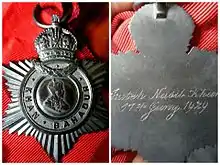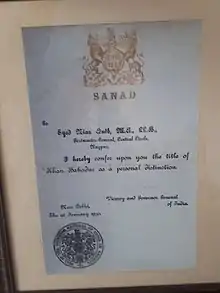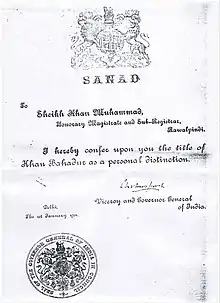Khan Bahadur
Khan Bahadur (Bengali: খান বাহাদুর, Urdu: خان بہادُر, Hindi: ख़ान बहादुर) – a compound of khan (leader) and bahadur (brave) – was a formal title of respect and honour, which was conferred exclusively on Muslim and other non-Hindu natives of British India. It was one degree higher than the title of Khan Sahib and one degree lower than Sardar Bahadur.[1]
| Khan Bahadur Medal | |
|---|---|
 Title Badge for Khan Bahadu | |
| Awarded for | Public service |
| Presented by | Viceroy & Governor-General of India on behalf of the Government of British-occupied India. Civil decoration |
| Eligibility | Muslim and non-Hindu native Indians |
| Post-nominals | KB |
| Status | Discontinued since 1947 |
| Last awarded | 1947 |
| Precedence | |
| Equivalent | Rai Bahadur (for Hindus) |
| Next (lower) | Khan Sahib |
The title was conferred on individuals for faithful service or acts of public welfare to the Empire. Recipients were entitled to prefix the title to their name and were presented with a special Title Badge and a citation (or sanad). It was conferred on behalf of the Government of British India by the Viceroy and Governor-General of India.[1]
The title was dis-established in 1947 upon the independence of India.[2]
The title "Khan Bahadur" was originally conferred in Mughal India on Muslim subjects in recognition of public services rendered and was adopted by British India for the same purpose and extended to cover other non-Hindu subjects of the India. Hindu subjects of British-occupied India were conferred the title of "Rai Bahadur".
Recipients
The following is a chronological list of selected recipients (the list below is not exhaustive):
- Raja Syed Muhammad Baquar Ali Khan Bahadur C.I.E. of Morni,Kotaha and Pindrawal
- 1887 Nawab Sirjaul Islam[3]
- 1905 Muhammad Habibullah was awarded the title of Khan Bahadur by the Indian government [4]
- 15 June 1902:Khan Bahadur Malik Lal Khan Sheriyal. Senior Station Manager He served 30 years to British India Railways. Awarded him (kasir-Hind Medal, India General Services Medal, Durbar Medal 1902)
- 1862: Rt.Hon Lft. Malik Gul Sher Ali Khan Bahadur Sheriyal of Pindigheb. Member Board of Administration Punjab 1849. (OBE, MBE, Kasir-Hind Medal)
- 14 June 1912: Khan Bahadur Sayed Rustom Ali (Registrar, Court of the Political Resident, Aden).[5]
- 1912: Khan Bahadur, Nadir Husain, District Superintendent of Police, Bengal. The title of Khan Bahadur was conferred on him in recognition of his services in the Police Department in June 1912.[6]
- 1914: Khan Bahadur Muhammad Hira Khan, (Civil Engineer from University of Roorkee (Gold Medalist); Supervisor, Public Works Department, Lucknow, United Provinces. Title conferred in January 1914. His daughter, Captain Dr. Sultana Latif Begum Khan became a surgeon in the British Army (Royal Army Medical Corps.) after graduating from Lady Hardinge Medical College. She was known by the name Captain Dr. Lila Bai Bahl after her marriage to a Hindu , Captain Parkash Chand Bahl (of the British Army, Prince of Wales' Own Scinde Horse)[7]
- 1918, Maulvi Abul Fazl Ahmad, Titabar, Jorhat, Assam
 "Saand" awarded in 1930 by Lord Irwin, Viceroy of India, to Syed Niaz Qutb
"Saand" awarded in 1930 by Lord Irwin, Viceroy of India, to Syed Niaz Qutb

- 1925: Khan Bahadur Maulvi Alimuzzaman Chaudhuri. M.L.C. Landholder and Chairman, District Board and Municipality, Faridpur.[8]
- 1928: Khan Bahadur Sardar Amir Saheb Rais of Manor, Bombay.
- 1929: Khan Bahadur Maj.Gen. Fateh Naseeb Khan (Commander-in-chief of Alwar State Forces), was awarded the title of Khan Bahadur on 17 January 1929 [9]
- 1930: Khan Bahadur, Syed Niaz Qutb (also spelled as Qutab), Postmaster General, Indian Civil Service, Government of India under the British Crown, titled conferred as a recognition of his personal distinction in administrative services and professional contribution to the institution of post office in British administered India [10][11][12][13]
- 1931: Khan Bahadur Maulvi Muhammad Fazlul Karim, retired Magte. and Collector, Bengal. The administrator of Refugees Bengal, Government of India.[14]
- 1935: Sheikh Abdullah (1874–1965), Indian educationalist, social reformer, lawyer, and the founder of Women's College, Aligarh.[15][16]
- 1936: Khan Bahadur Waliur Rahman, Planter and Proprietor of several tea gardens in Duars, Assam.[17]
- 1937: Khan Bahadur Muhammad Humayun, District Collector 1937-1939, ICS - Nellore. [18]
- 1938: Khan Bahadur Maulvi Muhammad Yahya, (retd.) Dy. Magte. and Dy. Collector and Chief Manager, Dacca Nawab Estate[19]
- 1943: Khan Bahadur Yousof Hossain Chaudhury, Vice-President, District School Board, Faridpur.[20]
- Aziz al-Hasan Ghouri [21]
References
- H. Taprell Dorling. (1956). Ribbons and Medals. A.H.Baldwin & Sons, London. p. 111.
- Sharma, B. K. Introduction to the Constitution of India, Published by Prentice-Hall, India, 2007, ISBN 8120332466, p. 83.
- Islam, Sirajul; Miah, Sajahan; Khanam, Mahfuza; Ahmed, Sabbir, eds. (2012). "Islam, Nawab Sirajul". Banglapedia: the National Encyclopedia of Bangladesh (Online ed.). Dhaka, Bangladesh: Banglapedia Trust, Asiatic Society of Bangladesh. ISBN 984-32-0576-6. OCLC 52727562. Retrieved 3 February 2021.
- Aḥmad Saʻīd (1997). Muslim India, 1857–1947: a biographical dictionary. Institute of Pakistan Historical Research. p. 144.
- Bahadur, R. (1912). Who's who in India - Supplement. Рипол Классик. ISBN 9785872301257.
- Second Supplement to Who's Who in India. Lucknow Newul Kishore Press. 1914
- Second Supplement of Who's Who in India brought up to 1914. Lucknow Newul Kishore Press. 1914. Archived from the original on 12 July 2020. Alt URL
- The Quarterly Civil List for Bengal. Corrected up to 1st April 1930. Appendix. Part II. List of Title-Holders and Recipients of Decorations, etc., in Bengal. Page No. 67
- Various (15 March 2007). Alwar State List of Leading Officials, Nobles and Personages. Potter Press. p. 4. ISBN 978-1-4067-3137-8.
- Report of the Committee of Bengal Chamber of Commerce, published in year 1931. Proceedings of the Annual General Meeting 1932, i to xxi. Bengal Chamber of Commerce, India. 1931.
- The India Office and Burma Office List ... Harrison and sons, Limited. 1920. p. 29.
- The India Office and Burma Office List ... Harrison and sons, Limited. 1928. p. 950.
- Vārshika Riporṭa. Department of India Posts and Telegraphs, British Government of India. 1929.
- Government of Bengal. The Bengal Civil List (Published annually). Corrected up to 1st July 1944. No. 279. Part II - List of Persons in Bengal Holding Titles Conferred or Recognized by His Excellency The Viceroy. Page 443
- "The Other Sheikh Abdullah". September 24, 2015. Archived from the original on 2015-09-24.
- "Aligarh Muslim University || Halls". www.amu.ac.in.
- The Bengal Civil List (Published half yearly) corrected up to 1st January 1937; Appendix – List of Title-Holders and Recipients of Decorations, etc. Page 696
- List of Collectors of Nellore, page 254 "Gazetteer of the Nellore District: Brought Upto 1938".
- Government of Bengal. The Bengal Civil List (Published annually). Corrected up to 1st July 1944. No. 279. Part II - List of Persons in Bengal Holding Titles Conferred or Recognized by His Excellency The Viceroy. Page 444
- Government of Bengal. The Bengal Civil List (Published annually). Corrected up to 1st July 1944. No. 279. Part II - List of Persons in Bengal Holding Titles Conferred or Recognized by His Excellency The Viceroy. Page 445
- Faiz Qaziabadi. "Aziz al-Hasan Majzoob". kashmiruzma.net. Kashmir Uzma. Retrieved 3 April 2020.
